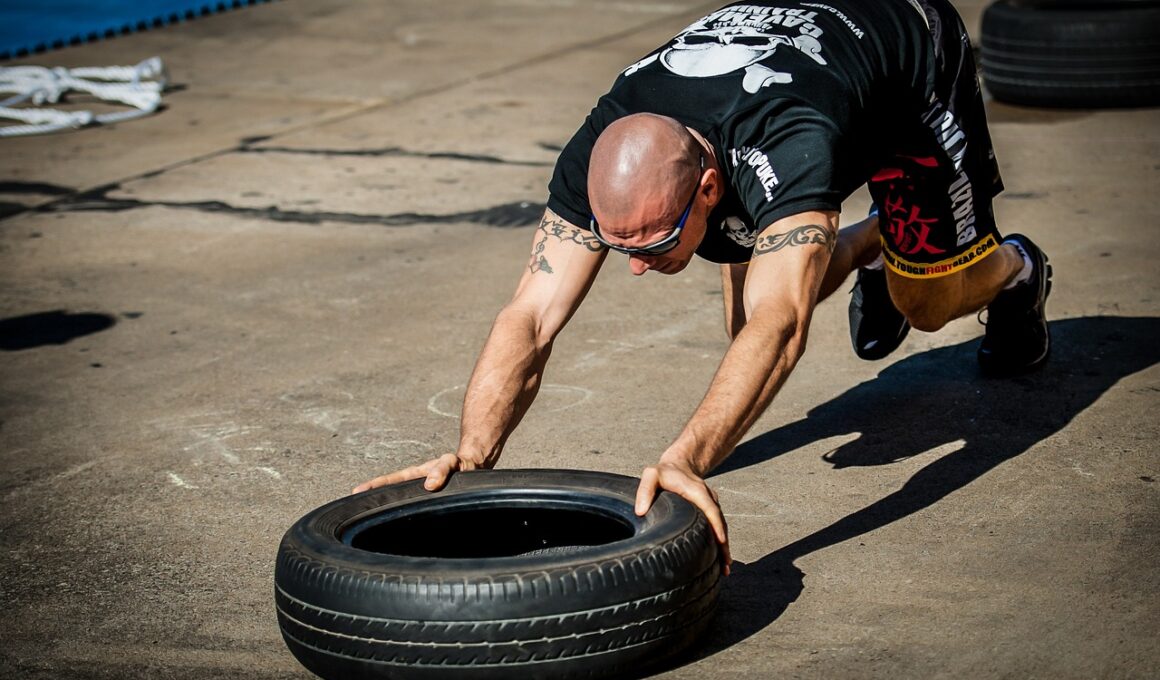Functional Training Bodyweight Challenges: Step Up Your Game
Functional training is a holistic approach aimed at improving overall health and fitness. It’s particularly effective when it emphasizes bodyweight exercises. These exercises harness the weight of your body as resistance, which leads to numerous benefits. Most importantly, bodyweight exercises enhance core strength, flexibility, and balance. Incorporating functional training in your routine can also improve daily activities, such as lifting objects or climbing stairs. Additionally, bodyweight workouts can increase muscular endurance and enhance cardiovascular health. You don’t necessarily need a gym for these exercises; your living room, local park, or any open space can serve as your gym. The versatility in bodyweight workouts is astounding and allows for numerous variations to challenge your body. Core-strengthening workouts, push-ups, squats, and lunges are excellent examples that activate multiple muscle groups at once. In addition to practical benefits, bodyweight exercises also help with mental resilience. Regularly engaging in challenging bodyweight workouts can significantly boost confidence and drive. Ultimately, mastering various bodyweight challenges can help sculpt the body while offering an enjoyable training experience. It’s time to step up your game with these powerful exercises!
The Importance of Body Awareness
One of the keys to effective functional training is developing body awareness, which is crucial during bodyweight exercises. This awareness helps in understanding how to move correctly while executing different movements. By focusing on your body mechanics, you can avoid injuries and improve your form. Mastering the basic techniques of functional training exercises can empower you to progress to advanced movements. For instance, understanding proper squat alignment can lead to safer and more effective squats over time. Moreover, exercises such as planks and push-ups require distinct body positioning that promotes awareness of your center of gravity. Proper alignment contributes to the overall effectiveness of the workout, ensuring that you engage the right muscles. Individuals new to functional training may struggle with form initially. However, consistent practice will lead to improvements, ultimately enhancing body control. A stable foundation is essential for executing complex movements like burpees or handstand push-ups. Additionally, body awareness fosters better performance in various fitness aspects, including speed, balance, and coordination. Thus, taking the time to build this awareness is fundamental in reaping the most benefits from bodyweight exercises.
A well-rounded functional training program incorporates a variety of bodyweight exercises that cater to different fitness levels. Beginners can start with basic movements, while more advanced athletes can challenge themselves with intense variations. For instance, you might start with push-ups on your knees before progressing to full push-ups. Functional training is catered to all fitness enthusiasts, making it adaptable and widely accessible. Bodyweight exercises also allow you to focus on endurance, strength, and flexibility at the same time. Consequently, the modifications available enable sustained progression throughout your fitness journey. Each workout can feel fresh and exciting due to the numerous combinations of movements available. This variety can reduce boredom, making workouts more enjoyable. Considering that bodyweight exercises often target multiple muscle groups, they can optimize calorie burn. When creating your workout routine, aim for a balanced combination of upper, lower, and core workouts. For instance, incorporate exercises like burpees, mountain climbers, and lunges to keep your heart rate elevated. Furthermore, establishing a clear goal can greatly enhance your results. Whether your aim is weight loss, endurance building, or strength enhancement, tailoring your program accordingly will yield the best results.
Progression of Bodyweight Exercises
Progression is a vital concept in functional training, and it applies equally to bodyweight exercises. As you become more comfortable with basic moves, incorporating progression can significantly enhance your strength and endurance. Consider variations of fundamental exercises to up the ante in your workouts. For example, you may begin with standard push-ups and then move on to decline push-ups or explosive push-ups to further challenge yourself. Notably, even simple exercises can be made more intense by adding unstable surfaces, such as balance boards or stability balls. This change forces your body to engage more muscle fibers to maintain balance, adding an extra layer of difficulty. It’s essential, however, to prioritize form over intensity to avoid injury. Slow and controlled movements should be maintained, particularly at the start of any progressive routine. Alongside this, it’s a good idea to mix strength and endurance training by incorporating circuit workouts. This approach tests both your strength and stamina while keeping things interesting. Ultimately, these progressions can lead to noticeable strength gains and improved athletic performance, making your bodyweight training immensely fruitful.
As you continue to challenge yourself with bodyweight exercises, it’s also crucial to monitor your recovery and overall wellness. Recovery is often overlooked yet is a fundamental aspect of any training regimen, including functional training. Prioritizing rest allows your muscles time to rebuild, enhancing strength and performance. Engaging in active recovery can also be beneficial, incorporating lighter exercises or stretches between intense workouts. Additionally, be mindful of nutritional needs, ensuring you’re fueling your body with the right nutrients post-workout. High-protein foods can help repair muscle damage, while complex carbohydrates can restore energy levels. Hydration plays an equally important role in recovery, ensuring that your muscles remain well-nourished and functional. Consider scheduling at least one full recovery day each week to allow your body mental and physical respite. Implementing yoga or Pilates can further enhance recovery through stretching and mobility work. Additionally, keeping a journal of your workouts can help track progress and adjust your training plan as necessary. Keep in mind that listening to your body is essential; if you feel excessively sore or fatigued, consider incorporating extra rest periods. This balanced approach will lead to sustainable improvements.
Fun Challenges to Try
To spice up your workout routine, consider integrating some fun challenges into your bodyweight training. Challenges foster motivation and can encourage you to push your limits while keeping things exciting. One idea is to set specific time-based goals, such as completing a number of push-ups or squats in one minute. Alternatively, you can try out weekly challenges with friends, like who can hold a plank the longest. These competitive elements not only boost motivation but can also make workouts more enjoyable, enhancing overall engagement. Another way to challenge yourself is to incorporate new exercises you’ve never tried before. For instance, mastering the one-legged squat or pistol squat can be exhilarating yet rewarding once achieved. Weekly themed workouts can also add a unique twist; dedicate one day to upper body workouts, the next for lower body, and finish with a core session. Make sure to always add variations and combinations of these exercises for a balanced approach. Finally, track your progress, perhaps through a fitness app or journal, to celebrate achievements, reinforcing your commitment to improvement. Keeping challenges fun will lead to ongoing engagement and remarkable results.
In conclusion, the power of bodyweight exercises in functional training cannot be overstated. They bring about numerous benefits that cater to diverse fitness goals while enhancing overall well-being. Whether you’re in a gym or at home, you can easily engage in meaningful workouts without special equipment. Strengthening your body through functional movements promotes not just fitness, but improved confidence and mental resilience. Remember, the journey is as rewarding as the results. The key to success lies in consistency and progression, staying committed to your goals while being mindful of your body’s needs. Make sure to integrate recovery periods, hydration, and nutrition into your regimen to promote effective results. Also, do not hesitate to adapt your routine as you become stronger and more skilled at certain movements. With a focus on body awareness, creativity in challenges, and the sheer versatility of bodyweight exercises, functional training can become an exciting and empowering component of your fitness journey. The more you can personalize your training to align with your preferences and goals, the more gains you will achieve. So, step up your game with bodyweight challenges and enjoy the journey!


